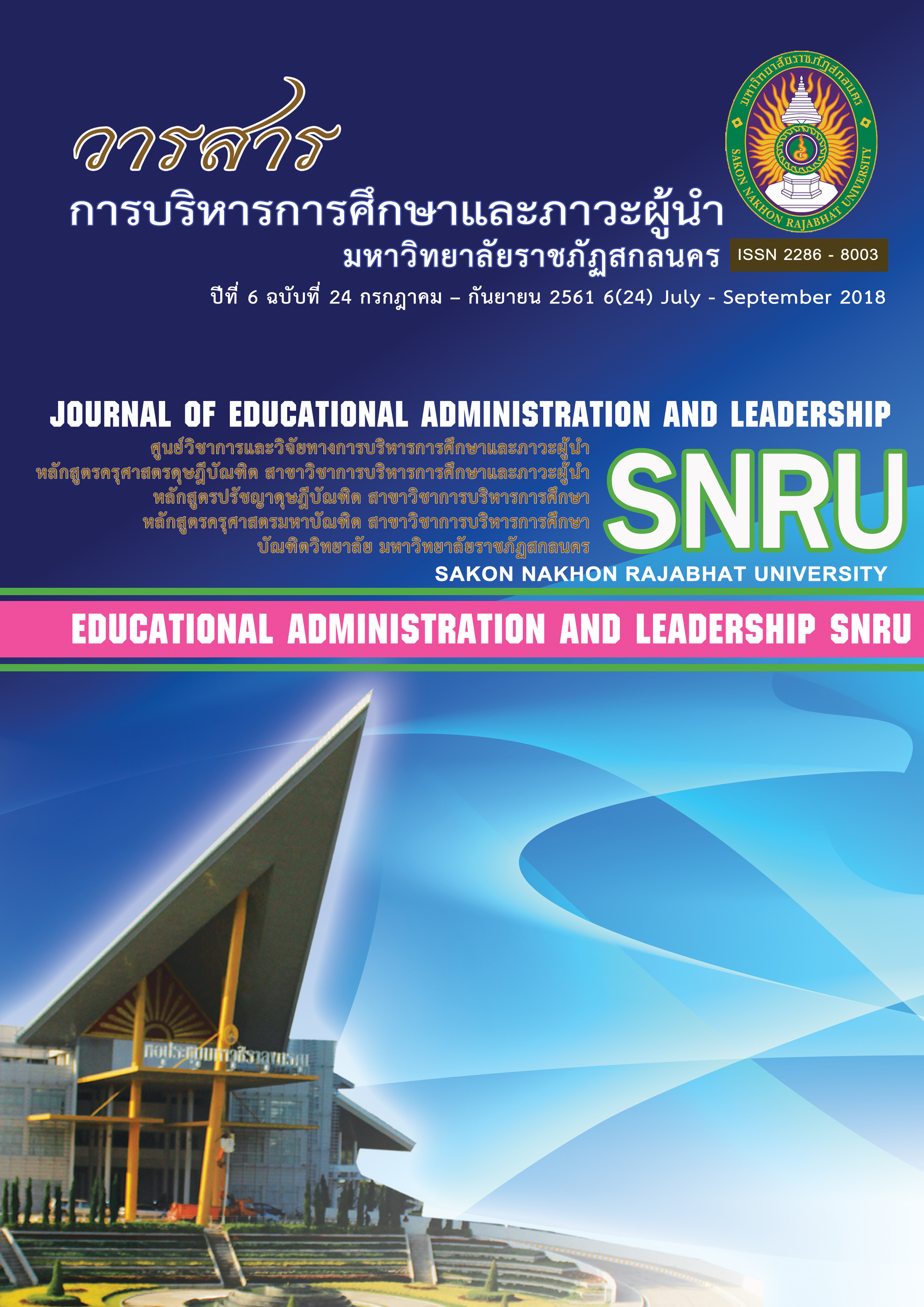

การพัฒนาคู่มือการจัดการเรียนรู้แบบร่วมมือเทคนิค STAD ร่วมกับกระบวนการแก้ปัญหา ของโพลยาที่ส่งผลต่อพฤติกรรมความร่วมมือ ความสามารถในการแก้ปัญหาและผลสัมฤทธิ์ทางการเรียน กลุ่มสาระการเรียนรู้คณิตศาสตร์ ของนักเรียนชั้นประถมศึกษาปีที่ 3
Development of the Manual for Stad Cooperative Learning in Conjunction Polya Problem Solving Process by Affecting Cooperative Behavior, Abilities to Solve Problems and Learning Achievements in Learning Substance of Mathematics Education for Prathomsuksa 3
ผู้แต่ง
สุภานันท์ ปั้นงาม, พูนสิน ประคำมินทร์, พัทธนันท์ ชมภูนุช
บทคัดย่อ
การวิจัยครั้งนี้ มีความมุ่งหมายเพื่อ 1) พัฒนาคู่มือการจัดการเรียนรู้ แบบร่วมมือเทคนิค STAD ร่วมกับกระบวนการแก้ปัญหาของโพลยา (Polya) มีประสิทธิภาพตามเกณฑ์ 75/75 2) ศึกษาพฤติกรรมความร่วมมือของนักเรียนหลังเรียนโดยใช้คู่มือการจัดการเรียนรู้ แบบร่วมมือเทคนิค STAD ร่วมกับกระบวนการแก้ปัญหาของโพลยา (Polya) 3) เปรียบเทียบความสามารถในการแก้ปัญหาก่อนเรียนและหลังเรียนของนักเรียนที่เรียนโดยใช้คู่มือการจัดการเรียนรู้ แบบร่วมมือเทคนิค STAD ร่วมกับกระบวนการแก้ปัญหาของโพลยา (Polya) 4) เปรียบเทียบผลสัมฤทธิ์ทางการเรียนก่อนเรียนและหลังเรียนของนักเรียนที่เรียนโดยคู่มือการจัดการเรียนรู้ แบบร่วมมือเทคนิค STAD ร่วมกับกระบวนการแก้ปัญหาของโพลยา (Polya) และ 5) พฤติกรรมความร่วมมือ ความสามารถในการแก้ปัญหาและผลสัมฤทธิ์ทางการเรียน กลุ่มสาระการเรียนรู้คณิตศาสตร์ของนักเรียนที่มีความฉลาดทางอารมณ์ต่างกัน (สูง ปานกลาง และต่ำ) หลังเรียนโดยใช้คู่มือการจัดการเรียนรู้ แบบร่วมมือเทคนิค STAD ร่วมกับกระบวนการแก้ปัญหาของโพลยา (Polya) มีความแตกต่างกัน กลุ่มตัวอย่างในการศึกษาครั้งนี้เป็นนักเรียนชั้นประถมศึกษาปีที่ 3 ภาคเรียนที่ 1 ปีการศึกษา 2560 โรงเรียนอนุบาลโสธิญา ศูนย์เครือข่ายลำน้ำทวย จำนวน 1 ห้องเรียน จำนวนนักเรียน 30 คน ซึ่งได้มาโดยการสุ่มแบบแบ่งกลุ่ม (Cluster Random Sampling) ซึ่งผู้วิจัยคาดว่าน่าจะเป็นกลุ่มตัวอย่างที่มีความเป็นเอกพันธ์ที่ดีของประชากรได้ เครื่องมือที่ใช้ประกอบด้วย 1) คู่มือการจัดการเรียนรู้แบบร่วมมือเทคนิค STAD ร่วมกับกระบวนการแก้ปัญหาของโพลยา (Polya) 2) แบบวัดพฤติกรรมความร่วมมือ 3) แบบทดสอบวัดความสามารถในการแก้ปัญหา และ 4) แบบทดสอบวัดผลสัมฤทธิ์ทางการเรียน สถิติที่ใช้ในการวิเคราะห์ข้อมูล ได้แก่ ค่าเฉลี่ย ส่วนเบี่ยงเบนมาตรฐานสถิติทดสอบค่า (t-test Dependent Samples) ค่าประสิทธิภาพ (Effectivenes : E1/E2) การวิเคราะห์ความแปรปรวนพหุคูณร่วมทางเดียว (One-way MANCOVA) และการวิเคราะห์ความแปรปรวนร่วมทางเดียว (One-way ANCOVA)
ผลการวิจัย พบว่า
1. คู่มือการจัดการเรียนรู้แบบร่วมมือเทคนิค STAD ร่วมกับกระบวนการแก้ปัญหาของโพลยา (Polya) มีค่าประสิทธิภาพสูงกว่าเกณฑ์ที่กำหนดไว้ คือ 75.57/75.41
2. พฤติกรรมความร่วมมือของนักเรียนโดยใช้ชุดคู่มือการจัดการเรียนรู้แบบร่วมมือเทคนิค STAD ร่วมกับกระบวนการแก้ปัญหาของโพลยา (Polya) หลังเรียนสูงกว่าก่อนเรียนอย่างมีนัยสำคัญทางสถิติที่ระดับ .05
3. ความสามารถในการแก้ปัญหาของนักเรียนโดยใช้ชุดคู่มือการจัดการเรียนรู้แบบร่วมมือเทคนิค STAD ร่วมกับกระบวนการแก้ปัญหาของโพลยา (Polya) หลังเรียนสูงกว่าก่อนเรียนอย่างมีนัยสำคัญทางสถิติที่ระดับ .05
4. ผลสัมฤทธิ์ทางการเรียนคณิตศาสตร์ของนักเรียนโดยใช้ชุดคู่มือการจัดการเรียนรู้แบบร่วมมือเทคนิค STAD ร่วมกับกระบวนการแก้ปัญหาของโพลยา (Polya) หลังเรียนสูงกว่าก่อนเรียนอย่างมีนัยสำคัญทางสถิติที่ระดับ .05
5. พฤติกรรมความร่วมมือ ความสามารถในการแก้ปัญหา และผลสัมฤทธิ์ทางการเรียน กลุ่มสาระคณิตศาสตร์ของนักเรียนที่มีความฉลาดทางอารมณ์ต่างกัน (สูง ปานกลาง ต่ำ) หลังเรียนโดยใช้คู่มือการจัดการเรียนรู้แบบร่วมมือเทคนิค STAD ร่วมกับกระบวนการแก้ปัญหาของโพลยา (Polya) มีความแตกต่างกัน
Abstract
The purposes of this study were to 1) development of The Manual for STAD Cooperative Learning in Conjunction Cooperative Problem Solving Process By Using Polya obtained efficiency of 75/75, 2) learn Cooperative Behavior of the students before and after being taught by the Manual for STAD Cooperative Learning Process in Conjunction with Problem Solving Process By Using Polya, 3) compare the abilities to solve mathematics problems of the students before and after being taught by the Manual for STAD Cooperative Learning Process in Conjunction with Problem Solving Process By Using Polya, 4) compare learning achievements before and after learning of the students through the Manual for STAD Cooperative Learning Process in Conjunction with Problem Solving Process By Using Polya, 5) the learning achievements, abilities to solve the problems and achievements in learning mathematics of the students whose emotional intelligences differed (high, moderate and low), after learning using The Manual for STAD Cooperative Learning in Conjunction Cooperative Problem Solving Process By Using Polya. there is different. The samples consisted of 30 Prathom Suksa 3 students in the first semester of 2017 academic year at Sotiya School collected by Purposive Sampling Technique. The tools used in this study were composed of : 1) the Manual for STAD Cooperative Learning in Conjunction Cooperative Problem Solving Process By Using Polya, 2) a form of Cooperative Behavior test, 3) a test of the abilities to solve problems, 4) a test of mathematical achievement. The collected data were analyzed using mean, standard deviation, Effectiveness : (E1/E2), t – test (Dependent Samples), One - way MANCOVA and One – way ANCOVA.
The findings of this study were as follows:
1. The Manual for STAD Cooperative Learning in Conjunction Cooperative Problem Solving Process By Using Polya obtained efficiency of 75.57/75.41
2. The learning achievements, after learning, using The Manual for STAD Cooperative Learning in Conjunction Cooperative Problem Solving Process By Using Polya were higher than before learning at the .05 level of significance.
3. The students’ abilities to solve the problems, after learning, using The Manual for STAD Cooperative Learning in Conjunction Cooperative Problem Solving Process By Using Polya were higher than before learning at the .05 level of significance.
4. After learning, the students’ achievements in learning mathematics using The Manual for STAD Cooperative Learning in Conjunction Cooperative Problem Solving Process By Using Polya were higher than before learning at the .05 level of significance.
5 The learning achievements, abilities to solve the problems and achievements in learning mathematics of the students whose emotional intelligences differed (high, moderate and low), after learning using The Manual for STAD Cooperative Learning in Conjunction Cooperative Problem Solving Process By Using Polya. there is different at the .05 level of significance.
คำสำคัญ
เทคนิค STAD, กระบวนการแก้ปัญหาโพลยา (Polya), พฤติกรรมความร่วมมือKeyword
Student Teams Achievement Division, Polya, CooperatingNotice: Undefined variable: dataSet in /var/www/html/ArticleView.php on line 116
Notice: Trying to access array offset on value of type null in /var/www/html/ArticleView.php on line 116
บทความทุกบทความเป็นลิขสิทธิ์ของ
Notice: Undefined variable: dataSet in /var/www/html/ArticleView.php on line 116
Notice: Trying to access array offset on value of type null in /var/www/html/ArticleView.php on line 116
เท่านั้น
กำลังออนไลน์: 29
วันนี้: 239
เมื่อวานนี้: 1,060
จำนวนครั้งการเข้าชม: 1,236,978
อาคารบัณฑิตวิทยาลัย ชั้น 2 ตำบลธาตุเชิงชุม อำเภอเมือง จังหวัดสกลนคร 47000
โทร/
แฟกซ์ 0-4297-0093
บรรณาธิการ: รองศาสตราจารย์ ดร.ไชยา ภาวะบุตร
ติดต่อ/สอบถาม: นายธีรเวทย์ เพียรธัญญกรณ์
โทร: 0-4297-0093